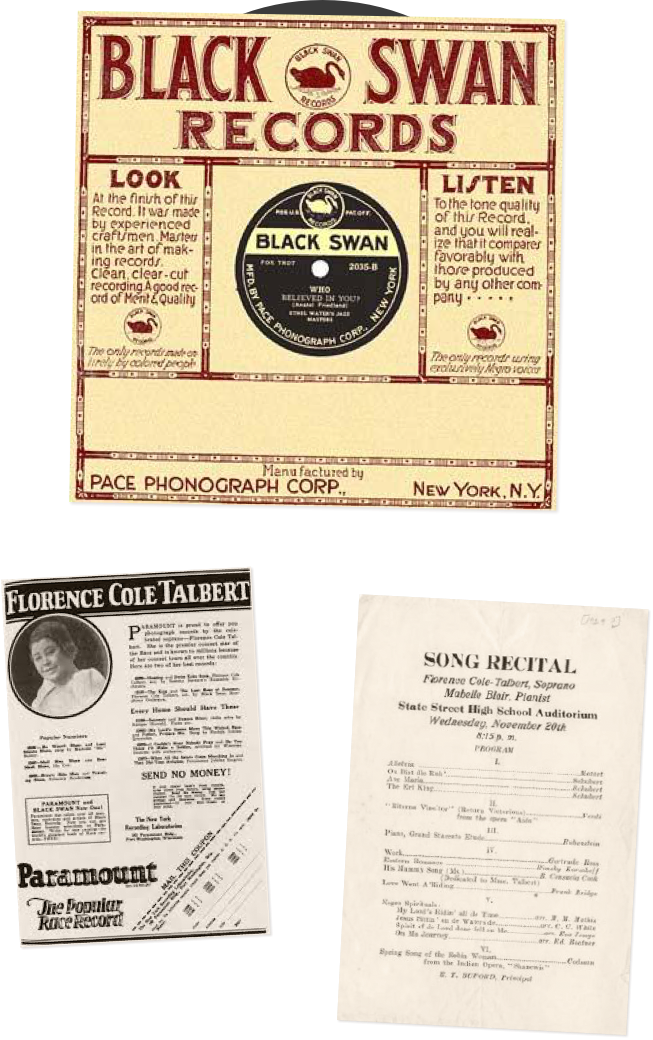
Exalted as “The First Lady of Grand Opera” and the “Queen of the Concert Stage” during her lifetime, Madame Florence Cole Talbert McCleave was a true pioneer of opera and amongst the first African American woman to achieve international acclaim in her field. During her long road to stardom, McCleave shattered glass ceilings left and right, accruing a list of historical “firsts” that is nothing less than astonishing. Although very much a diva in the classical sense, McCleave embodied the selflessness, patience, and generosity that would fly in the face of our modern usage of the term, building a legacy that still resonates throughout her adoptive home of Memphis.

Born on June 17, 1890 in Detroit, Michigan, Florence Cole was immersed in music from her earliest days. Her mother Sadie was a celebrated mezzo-soprano and a former member of the famed Fisk Jubilee Singers, while her father Thomas was a talented basso known for being a dramatic reader. Unsurprising given her roots, Florence began her musical education at a very young age, training as both a vocalist and pianist. In 1898, Florence and her family relocated to Los Angeles, where she continued her musical endeavors.
As the first black student to attend Los Angeles High School, Florence began to garner attention for her undeniable talents, eventually leading her to train under the tutelage of renowned sopranos Gloria Mayne Windsor and Emma Azalia Hackley at the age of sixteen. Her talents led to her selection as a soloist for her school’s commencement events, making her the first black student to participate in a high school commencement program in Los Angeles history.
After attending college at the University of Southern California College of Music, where she specialized in oratorio, Florence began touring with Hahn’s Jubilee Singers throughout North America. Soon after, she married Wendall Talbert, the group’s pianist. Although the marriage would prove to be short-lived, Florence retained his last name for professional reasons.

In 1916, she relocated to Chicago and enrolled at the Chicago Musical College, eventually becoming the first black student to appear in one of the school’s programs. After graduating with the school’s highest honors, Florence began to make solo appearances in Detroit, Los Angeles, New York and Chicago, dazzling crowds with her unparalleled vocal abilities and earning a reputation as an idol of the stage. “Her voice was pure and high and held appealing expression that was exquisite at times, then full of the sunlight or spring, or again told this gripping tale with pathos and sympathy,” wrote The Washington Times.


In 1919, Florence McCleave began her recording career with George Broome’s Broome Special Phonograph label, making her one of the very few African American classical singers to be recorded during the era. In the following years, she would record additional sides for Black Swan Records, the earliest major label to be owned and operated by African Americans, as well as with Paramount Records, where her music was a major departure from that label’s normal output of so-called “race records.” These recordings displayed the versatility and range of her repertoire and included spirituals, modern compositions, and classic operatic arias.


During the years of 1925 to 1927, McCleave continued to hone her craft in Europe, where she studied under some of the continent’s most accomplished operatic instructors. In March of 1927, she accomplished a life-long goal by appearing in the title role of Giuseppe Verdi’s Aida, becoming the first African American to do so alongside an all-white professional company. Reflecting on her decision to become an opera singer, McCleave recalled first seeing a production saying,
With this major milestone now achieved, McCleave returned to the United States a few months later and resumed her popular tour of recitals. While on tour in Tennessee, she met her second husband Benjamin F. McCleave, and the two married in 1930.


Having already conquered the heights of the opera world, McCleave spent much of the next few decades dedicating her time towards mentoring and educating the new generation of aspiring singers and musicians. In 1930, she accepted a teaching position at Bishop College in Texas, where she became the school’s first black director of music. From there, she would head the vocal departments at the Tuskegee Institute, Alabama State College, and Fisk University, before eventually settling in Memphis.
In addition to opening her own private studio in the city, McCleave was also instrumental in bringing world-renown artists to perform at LeMoyne-Owen College, giving many young African American musicians their first exposure to legendary vocalists such as Leontyne Price and Marian Anderson. Furthermore, McCleave was a co-founder of the Memphis Music Association and the Christian Science Society Church of Memphis, further bolstering her reputation as a pillar of the community.


Carla Thomas, the renowned Stax-era soul singer, was one of the many children mentored by McCleave. In an interview, she recalled how McCleave helped to foster her love of singing, saying
Notable singers such as Vera Little, La Julia Rhea, and Marian Anderson were also amongst McCleave’s notable protégées. In 1953, just a week after her 63rd birthday, McCleave was awarded a Certificate of Merit from the National Negro Opera Guild, which bestowed her with the unofficial title of “The First Lady of Grand Opera.” For the next few years, she remained active in her adopted home of Memphis until her death in 1961.
Over fifty years after her passing, in the fall of 2017, Opera Memphis launched The McCleave Project, an initiative aimed at engaging with the issues of equity and diversity in opera. The following year, the organization launched The McCleave Fellowships program, which was designed “to create early career opportunities for directors and conductors of color.”
Nearly 130 years after her birth, it’s clear that Florence Cole Talbert-McCleave’s legacy of artistic greatness, inclusion, and altruism still reverberate strongly to this day throughout Memphis and the world.
Be the first to add your voice.